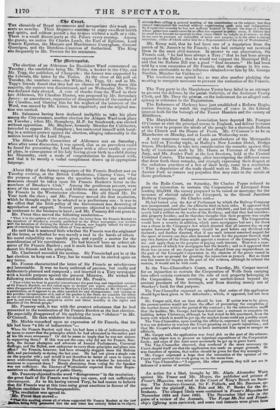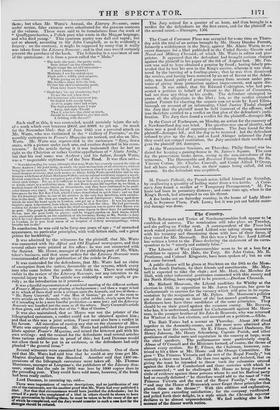An action for a libel, brought by Mr. Alaric Alexander
Watts against Mr. Fraser and Mr. 'Aloyes, the publisher and printer of Fraser's Magazine, was tried in the Court of King's Bench on Satur- day. The Attorney-General, Sir F. Pollock, and Mr. Barstow, ap- peared for the plaintiff; Mr. Erie and Mr. P. Banks for the de- fendants. The alleged libels were contained in Fraser's Magazine for November 1834 and June 1835. The November libel was in the guise of a review of the Annuals. The Forget Me Not and Friend- ship's Wiring were reviewed, and some real extracts were given from
them ; but when Mr. Watts's Annual, the Literary Sohvenir, came under notice, false extracts were substituted for the genuine contents of the volume. These were said to be translations from the work of
Quaffypunchovies, a Polish poet who wrote in the Maygar language, and who died young." This spurious poetry was dull and vapid; but not so absurd, according to Sir John Campbell, as to be evidently a forgery : on the contrary, it might be supposed by many tlat it really was taken from the Literary Souvenir; and in that case would certainly prevent the purchase of the book. The following is a specimen of one of the quotations : it is from a poem called the " Mole."
" The mole, the mole, the pretty mole,
Dear infant 1 on thy shoulder, Might tempt the art of Cattermole-
A ino.t intense ')eliolder 1 Methinks I see his ardent eyes
Flash with a wildly glad surprise,
While gazing ou my child, His faultless fancy feels the tint,
Of that fair skin's enhancing print,
From fairy hands beguiled print, From Hard duty 't is, my slumbering boy!
To use the rod, when thou
Art boisterous with irreverent joy,
Or dash'd with moody brow. At ev'ry angry word and stripe,
The fund paternal tears I wipe
Away, and sigh, •Tis odd
That I, who love this child so much,
Should feel compelled to give him such A tickling with the rod!"
Such stuff as this, it was contended, would certainly injure the sale of a work which cost between 20001. and 3000/. to get up. So much for the November libel : that of June 1835 was a personal attack on Mr. Watts, who was victimized in the " Gallery of Portraits," as the monthly caricatures in Fraser's .Magazine are termed, and also on Mrs. Watts. Mr. Watts was represented in the caricature " flying down stairs, with a picture under each arm, and caution depicted in his coun- tenance." In the article facing it it was insinuated that he had no right to the Christian or rather Gothic appellations of " Alaric Attila," but that his real name was Andrew ; and his father, Joseph Watts, was a " respectable nightman " of the New Road. It was then said-
.. Notwithstanding his many attempts that way, Watts has scarcely earned the title of Merry Andrew;' his jests being, in south, the most melancholy of all utterances, without being the most musical. We feel bound to add, however. that it is not very likely, in the usual chances of events, that such names as Alaric Attila Watts should have met in ma. trimony with those of Zillah MationnaWiffen; and an unkind world may suspect a mysti. fication somewhere, if the scraggiest part of the neck of the world should trouble itself about such things. For us, it is sufficient to know that such a person, whether Andrew or Alaric, exists as a scribbling man. He anti Bunn began life together in, we think, a medical board off elarges Street, or thereabouts, and they have continued to lie parti- cular friends ever since. Watts, having a taste for literature, was employed to write letterpress for the Kit Kat Club, which Croker demolished in quick time; and we and the Ex-Secretary refers, in one of his articles in the very last Quarterly, with satisfac- tion to the deed. Ile then got employed in the Leeds Intelligencer ; being sped from which, he tried his hand again in London, and got up a Souvenir. It was his merit to improve upon Ackermann, from whom, however, lie stole the idea. He had previously written for Jordan's Gazette. in which his chief occupation was to prove that Byron was no poet. The people in Blackwood. who had some reason in those days for patronizing Byron, tore the poor Goth to pieces; and lie begged pardon on both knees, which was graciously granted, on the condition of his becoming flunky to Mr. North—a duty whiat lie very observantly performed. After floundering about in various speculations in London. he is now head nurse of an hospital of rickety newspaperlings, which breathe but to die."
In conclusion, be was said to be forty-one years of age ; " of unwashed appearance, no particular principles, with well-bitten nails, and a great genius for backbiting."
It was admitted by the witnesses for the plaintiff, that Mr. Watts was connected with the Alfred and Old England newspapers, and that several others were printed at his office : he was not connected with the Satirist. Mr. Howe, manager of the publishing part of Mr. Whit- taker's business, said that some orders for the Literary Souvenir were countermanded after the publication of the article in Fraser.
It was contended for the defendants, that Mr. Watts had no claim of exemption from the notice, favourable or the reverse, which every man who came before the public was liable to. There was nothing unfair in the review of the Literary Souvenir, nor any intention to do especial injury to it. The article was evidently a mere squib, or pa- rody; as the introduction to it proved— It was a fanciful representation of a convivial meeting of the different authors of Fraser's Magazine, some playing at backgammon ; and then a wager is laid as to which of them shall write a critique upon the Annuals, and two of them- " Mr. Barry Cornwall," and " the Man of Genius," go out of the room to write articles on the Annuals, which they called rubbish, clearly upon the face of it intending to be a mere fanciful production—a mere jest ; and the Literary Souvenir was handled just the same as all the others. parry Cornwall's article is then given, and afterwards that of the " Man of Genius."
It was also maintained, that as Moyes was not the printer of the lithographed caricature, a verdict could not be obtained against him ; and that as this was a joint action, Fraser must also have a verdict in his favour. All intention of casting any slur on the character of Mrs. Watts was expressly disowned. Mr. Watts had published the grossest libels against Fraser's Magazine, and mixed the bitterest gall with his own writings : and the counsel for the defendants read several articles from various publications in proof of this ; but Lord Denman would not allow them to be put in as evidence, as the defendants had only pleaded " the general issue."
Several witnesses were examined for the defendants. One of them said that Mr. Watts had told him that he could at any time get Mr. Magian displaced from the Standard. Another said that 1400 im- pressions of the lithograph caricature were taken off. Mr. Thomas Huntsman, manager at Longman's, the publishers of the Literary Sou- venir, stated that the sale in 1832 was less by 1600 copies than in the preceding year. They could have sold more, however, if the book had been ready earlier.
Lord Denman, in summing up, said— There were imputations of various descriptions, and no justification of any one of the statements, nor the smallest proof that Mr. Watts had ever published a libel. Not that that circumstance would have justified the defendants; but he owned if a party who complained of a libel in others should be shown to have given provocation by libelling them, he must be taken to be the cause of the act of which he complained, and the Jury would consider in such a case how far the ilaalaff&I should be reduced.
The Jury retired for a quarter of un hour, and then brought in a verdict for the defendants on the first count, and for the plaintiff on the second count.—Damages, 1501.



























 Previous page
Previous page